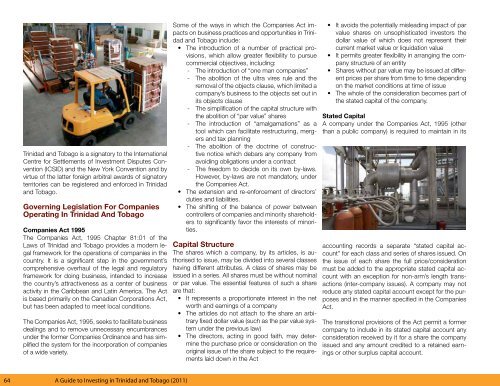A Guide to Investing in Trinidad and Tobago (2011) - Ministry of ...
A Guide to Investing in Trinidad and Tobago (2011) - Ministry of ...
A Guide to Investing in Trinidad and Tobago (2011) - Ministry of ...
Create successful ePaper yourself
Turn your PDF publications into a flip-book with our unique Google optimized e-Paper software.
Tr<strong>in</strong>idad <strong>and</strong> <strong>Tobago</strong> is a signa<strong>to</strong>ry <strong>to</strong> the International<br />
Centre for Settlements <strong>of</strong> Investment Disputes Convention<br />
(ICSID) <strong>and</strong> the New York Convention <strong>and</strong> by<br />
virtue <strong>of</strong> the latter foreign arbitral awards <strong>of</strong> signa<strong>to</strong>ry<br />
terri<strong>to</strong>ries can be registered <strong>and</strong> enforced <strong>in</strong> Tr<strong>in</strong>idad<br />
<strong>and</strong> <strong>Tobago</strong>.<br />
Govern<strong>in</strong>g Legislation For Companies<br />
Operat<strong>in</strong>g In Tr<strong>in</strong>idad And <strong>Tobago</strong><br />
Companies Act 1995<br />
The Companies Act, 1995 Chapter 81:01 <strong>of</strong> the<br />
Laws <strong>of</strong> Tr<strong>in</strong>idad <strong>and</strong> <strong>Tobago</strong> provides a modern legal<br />
framework for the operations <strong>of</strong> companies <strong>in</strong> the<br />
country. It is a significant step <strong>in</strong> the government’s<br />
comprehensive overhaul <strong>of</strong> the legal <strong>and</strong> regula<strong>to</strong>ry<br />
framework for do<strong>in</strong>g bus<strong>in</strong>ess, <strong>in</strong>tended <strong>to</strong> <strong>in</strong>crease<br />
the country’s attractiveness as a center <strong>of</strong> bus<strong>in</strong>ess<br />
activity <strong>in</strong> the Caribbean <strong>and</strong> Lat<strong>in</strong> America. The Act<br />
is based primarily on the Canadian Corporations Act,<br />
but has been adapted <strong>to</strong> meet local conditions.<br />
The Companies Act, 1995, seeks <strong>to</strong> facilitate bus<strong>in</strong>ess<br />
deal<strong>in</strong>gs <strong>and</strong> <strong>to</strong> remove unnecessary encumbrances<br />
under the former Companies Ord<strong>in</strong>ance <strong>and</strong> has simplified<br />
the system for the <strong>in</strong>corporation <strong>of</strong> companies<br />
<strong>of</strong> a wide variety.<br />
64 A <strong>Guide</strong> <strong>to</strong> <strong>Invest<strong>in</strong>g</strong> <strong>in</strong> Tr<strong>in</strong>idad <strong>and</strong> <strong>Tobago</strong> (<strong>2011</strong>)<br />
Some <strong>of</strong> the ways <strong>in</strong> which the Companies Act impacts<br />
on bus<strong>in</strong>ess practices <strong>and</strong> opportunities <strong>in</strong> Tr<strong>in</strong>idad<br />
<strong>and</strong> <strong>Tobago</strong> <strong>in</strong>clude:<br />
• The <strong>in</strong>troduction <strong>of</strong> a number <strong>of</strong> practical provisions,<br />
which allow greater flexibility <strong>to</strong> pursue<br />
commercial objectives, <strong>in</strong>clud<strong>in</strong>g:<br />
- The <strong>in</strong>troduction <strong>of</strong> “one man companies”<br />
- The abolition <strong>of</strong> the ultra vires rule <strong>and</strong> the<br />
removal <strong>of</strong> the objects clause, which limited a<br />
company’s bus<strong>in</strong>ess <strong>to</strong> the objects set out <strong>in</strong><br />
its objects clause<br />
- The simplification <strong>of</strong> the capital structure with<br />
the abolition <strong>of</strong> “par value” shares<br />
- The <strong>in</strong>troduction <strong>of</strong> “amalgamations” as a<br />
<strong>to</strong>ol which can facilitate restructur<strong>in</strong>g, mergers<br />
<strong>and</strong> tax plann<strong>in</strong>g<br />
- The abolition <strong>of</strong> the doctr<strong>in</strong>e <strong>of</strong> constructive<br />
notice which debars any company from<br />
avoid<strong>in</strong>g obligations under a contract<br />
- The freedom <strong>to</strong> decide on its own by-laws.<br />
However, by-laws are not m<strong>and</strong>a<strong>to</strong>ry, under<br />
the Companies Act.<br />
• The extension <strong>and</strong> re-enforcement <strong>of</strong> direc<strong>to</strong>rs’<br />
duties <strong>and</strong> liabilities.<br />
• The shift<strong>in</strong>g <strong>of</strong> the balance <strong>of</strong> power between<br />
controllers <strong>of</strong> companies <strong>and</strong> m<strong>in</strong>ority shareholders<br />
<strong>to</strong> significantly favor the <strong>in</strong>terests <strong>of</strong> m<strong>in</strong>orities.<br />
Capital Structure<br />
The shares which a company, by its articles, is authorised<br />
<strong>to</strong> issue, may be divided <strong>in</strong><strong>to</strong> several classes<br />
hav<strong>in</strong>g different attributes. A class <strong>of</strong> shares may be<br />
issued <strong>in</strong> a series. All shares must be without nom<strong>in</strong>al<br />
or par value. The essential features <strong>of</strong> such a share<br />
are that:<br />
• It represents a proportionate <strong>in</strong>terest <strong>in</strong> the net<br />
worth <strong>and</strong> earn<strong>in</strong>gs <strong>of</strong> a company<br />
• The articles do not attach <strong>to</strong> the share an arbitrary<br />
fixed dollar value (such as the par value system<br />
under the previous law)<br />
• The direc<strong>to</strong>rs, act<strong>in</strong>g <strong>in</strong> good faith, may determ<strong>in</strong>e<br />
the purchase price or consideration on the<br />
orig<strong>in</strong>al issue <strong>of</strong> the share subject <strong>to</strong> the requirements<br />
laid down <strong>in</strong> the Act<br />
• It avoids the potentially mislead<strong>in</strong>g impact <strong>of</strong> par<br />
value shares on unsophisticated <strong>in</strong>ves<strong>to</strong>rs the<br />
dollar value <strong>of</strong> which does not represent their<br />
current market value or liquidation value<br />
• It permits greater flexibility <strong>in</strong> arrang<strong>in</strong>g the company<br />
structure <strong>of</strong> an entity<br />
• Shares without par value may be issued at different<br />
prices per share from time <strong>to</strong> time depend<strong>in</strong>g<br />
on the market conditions at time <strong>of</strong> issue<br />
• The whole <strong>of</strong> the consideration becomes part <strong>of</strong><br />
the stated capital <strong>of</strong> the company.<br />
Stated Capital<br />
A company under the Companies Act, 1995 (other<br />
than a public company) is required <strong>to</strong> ma<strong>in</strong>ta<strong>in</strong> <strong>in</strong> its<br />
account<strong>in</strong>g records a separate “stated capital account”<br />
for each class <strong>and</strong> series <strong>of</strong> shares issued. On<br />
the issue <strong>of</strong> each share the full price/consideration<br />
must be added <strong>to</strong> the appropriate stated capital account<br />
with an exception for non-arm’s length transactions<br />
(<strong>in</strong>ter-company issues). A company may not<br />
reduce any stated capital account except for the purposes<br />
<strong>and</strong> <strong>in</strong> the manner specified <strong>in</strong> the Companies<br />
Act.<br />
The transitional provisions <strong>of</strong> the Act permit a former<br />
company <strong>to</strong> <strong>in</strong>clude <strong>in</strong> its stated capital account any<br />
consideration received by it for a share the company<br />
issued <strong>and</strong> any amount credited <strong>to</strong> a reta<strong>in</strong>ed earn<strong>in</strong>gs<br />
or other surplus capital account.


